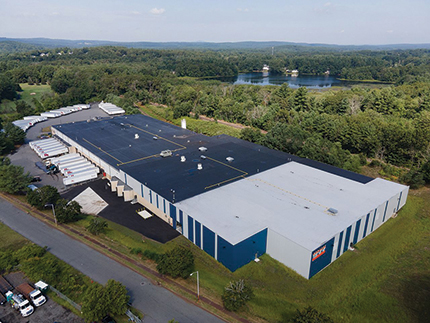Maugel Architects completes 40,000 s/f NewCorr Packaging warehouse expansion

Northborough, MA Construction of the 40,000 s/f warehouse addition for NewCorr Packaging, designed by Maugel Architects, has been completed. With the challenge of a tight and steep site, Maugel worked closely with civil and structural engineers to maximize the addition footprint and provide additional loading docks to meet daily truck volume.
Particular attention was paid to maximizing storage for the large paper rolls while designing safe walking and forklift aisles for employees. High humidity levels generated by the manufacturing process were a major design concern. To meet the challenge, Maugel worked closely with NewCorr and the engineering team to design systems and a final layout that successfully controlled humidity throughout the warehouse. Renovations to the front entry, lobby, restrooms, and office area modernized the spaces and provided full accessibility for NewCorr’s employees and visitors.
“Expanding and renovating a manufacturing facility while it continues to operate brings many challenges. From the start, Maugel’s project approach was exceptional,” said Rhett Bartlett, vice president & general manager at NewCorr Packaging. “Maugel incorporated our goals, developed a strong plan, and limited costly changes, overruns, and interruptions. The team did an excellent job—their expertise and commitment ensured a successful project. We are very happy with the result and with our choice of Maugel as our architectural firm,” said Bartlett.
Maugel worked with the engineering team of TFMoran, WDA Design Group, and Vlachos Associates; owner’s rep, M. David Company; and F.W. Madigan Company as the general contractor.
The New England Real Estate Journal presents the First Annual Project of the Year Award! Vote today!








